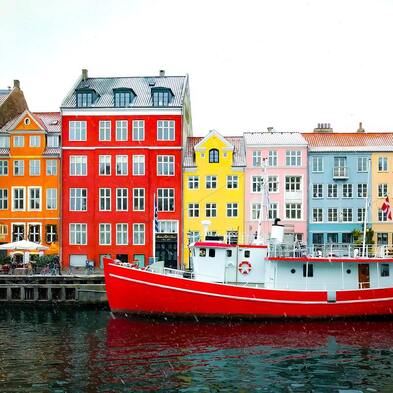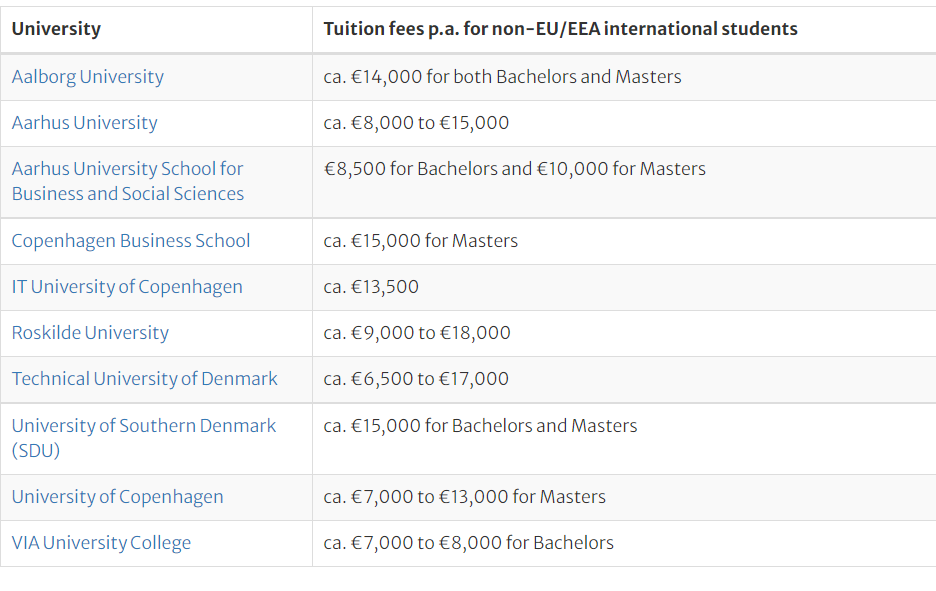- Home
- English to Italian Translation Services
-
FREE RESOURCES
-
Citizenship by Descent: Free Guide
>
- 5 Benefits of Italian Dual Citizenship
- 14 Documents Needed for Italian Dual Citizenship [Free Checklist]
- Citizenship by Descent: Get it in ITALY
- Gaining Italian Citizenship via Female Ancestors
- Italian Dual Citizenship: Get it Through the Courts
- Reacquisition of Italian Citizenship
- Price of Italian Citizenship: How Much Will it Cost?
- How long does it take to get Italian citizenship?
- Citizenship by Marriage >
- Canadian-Italian Dual Citizenship
-
Citizenship by Descent: Free Guide
>
- Blog
- Contact
 Do you want to go to Denmark for your studies? Why not? As an exporter of fairy tales and hygge, Denmark often tops the charts of the world’s happiest countries. With its love of design and air of effortless cool, not to mention the wide range of English-taught programmes offered by Danish universities, the government has also become a prime destination for international students.  THE COST OF TUITION FEES A university education in Denmark is free for EU/EEA students or permanent residents. For all other international students, the fees can range between about €6,000 and €18,000 a year, depending on the programme. The cheapest universities will charge between €6,000 to €9,000 per year, but this will depend on the type of programme. Bachelor’s degrees tend to be cheaper than Master’s degrees. While it is a member of the EU, Denmark did not adopt the euro – its currency is the Danish krone (DKK). It is pegged to the euro at a fixed rate of 7.46 DKK per EUR. Let’s take a look at international tuition fees at some of Denmark’s most famous universities: ARE THERE APPLICATION FEES AT DANISH UNIVERSITIES? Students from the EU/EEA won’t have to pay fees when applying to universities in Denmark. Still, students outside the EU/EEA are usually charged an application fee of DKK 750 / €100. If you are required to pay this fee, you are charged separately by every Danish university you apply to, but it can cover some applications at the same institution. For example, at Aarhus University, the application fee covers up to three applications. Some more exemptions: Non-EU/EEA students with a permanent residence permit will not have to pay application fees. This also applies to those students who have already completed a Danish undergraduate degree and are applying for a Master’s degree. Note: If you are a student from outside the EU/EEA, you will also need to factor in the cost of your residence permit. Costs for student visa and residence permit While students from the EU, EEA or Switzerland can study in Denmark without needing a visa, other international students will need to apply for a residence permit. There are some eligibility conditions you will need to consider: for example, language and financial requirements.
The cost of applying for a residence permit as a student is about €255. EU/EEA students don’t need a visa. However, they will need to get a registration certificate within three months of arriving in the country. This can be obtained from the regional state administration. CAN YOU STUDY IN DENMARK FOR FREE? Students from the EU/EEA and permanent residents can study tuition-free at a Denmark university. For students outside the EU/EEA who are not permanent residents, fees can be pretty high – however, some scholarship options can help. ARE THERE SCHOLARSHIPS FOR INTERNATIONAL STUDENTS GOING TO DENMARK? Life as an international student can be expensive. Thankfully, there are some scholarships that international students can apply for to study in Denmark. Here are some options: Denmark has a generous State Educational Grant (SU, short for Statens Uddannelsesstøtte) and Loan Scheme available for Danish and EU/EEA students. For non-EEA students, there is a limited number of merit-based scholarships for highly qualified students. These scholarships are managed by the universities directly. If you’re eager to study in Denmark but find a full degree out of reach financially, consider an exchange programme from your home university. The shorter stay might make it more affordable, and via exchange programmes like the viral Erasmus+ scheme, you would also receive funding. WHAT IS THE MONTHLY COST OF LIVING AS A STUDENT IN DENMARK? Denmark is not cheap, and the local cost of living is higher than in many other European countries. However, keep in mind that, as an international student, your expenses will depend on your choices and lifestyle. You may be able to find rooms for rent for less than €500 per month, but especially in the capital Copenhagen, prices will generally be higher. Factor in about €200/€300 for food – maybe less if you scout for deals at discount supermarkets. As for transport, it could cost you about €50 per month. But that’s a manageable expense to avoid because bikes are trendy in Denmark, and a second-hand bike should not cost more than €150. You should generally expect to spend around €750 to €900 monthly and up to €1,200 in Copenhagen. This level of monthly expenses is also roughly reflected in the budget you’ll have to demonstrate you can cover if you need to apply for a Danish student visa. CAN INTERNATIONAL STUDENTS WORK DURING THEIR STUDIES? Finding a part-time job during your studies is not only a way to finance your student life. You can widen your social and professional network, gain valuable work experience and learn new skills. Also, depending on the job, you might get the chance to practise your Danish – which will be essential for you to learn not only for your professional life (especially if you plan to stay in Denmark after your studies) but also to make the most of your experience as an international student in Denmark. EU/EEA students can work during their studies and after graduation without restrictions on the number of hours. For all other international students, there are some restrictions to keep in mind: You can work 20 hours a week during term time and full-time in June, July and August. Upon graduation, you will have six months to find employment and apply for a professional visa. If you need assistance to translate your documents see my website Translations
0 Comments
Your comment will be posted after it is approved.
Leave a Reply. |
AuthorI'm Natalia Bertelli, an English/Spanish to Italian legal translator. Since 2008 I have been working on contracts, judicial deeds, certificates, corporate translations for foreign clients who want to do business in Italy, get a dual citizenship or simply settle in my beautiful country. Categories
All
|
NATALIA BERTELLI, ENGLISH TO ITALIAN SWORN TRANSLATOR
ENGLISH TO ITALIAN LEGAL TRANSLATIONS | SWORN TRANSLATOR | TRANSLATOR COACH | ATA MEMBER
LISTED ON THE UK.GOV AND IN THE US EMBASSY LIST OF TRANSLATORS
Intl. calls: +39 338 263 7469 (Claudia, Project Manager)
[email protected]
VAT No. 01404870295
Privacy Policy
ENGLISH TO ITALIAN LEGAL TRANSLATIONS | SWORN TRANSLATOR | TRANSLATOR COACH | ATA MEMBER
LISTED ON THE UK.GOV AND IN THE US EMBASSY LIST OF TRANSLATORS
Intl. calls: +39 338 263 7469 (Claudia, Project Manager)
[email protected]
VAT No. 01404870295
Privacy Policy
- Home
- English to Italian Translation Services
-
FREE RESOURCES
-
Citizenship by Descent: Free Guide
>
- 5 Benefits of Italian Dual Citizenship
- 14 Documents Needed for Italian Dual Citizenship [Free Checklist]
- Citizenship by Descent: Get it in ITALY
- Gaining Italian Citizenship via Female Ancestors
- Italian Dual Citizenship: Get it Through the Courts
- Reacquisition of Italian Citizenship
- Price of Italian Citizenship: How Much Will it Cost?
- How long does it take to get Italian citizenship?
- Citizenship by Marriage >
- Canadian-Italian Dual Citizenship
-
Citizenship by Descent: Free Guide
>
- Blog
- Contact
 RSS Feed
RSS Feed